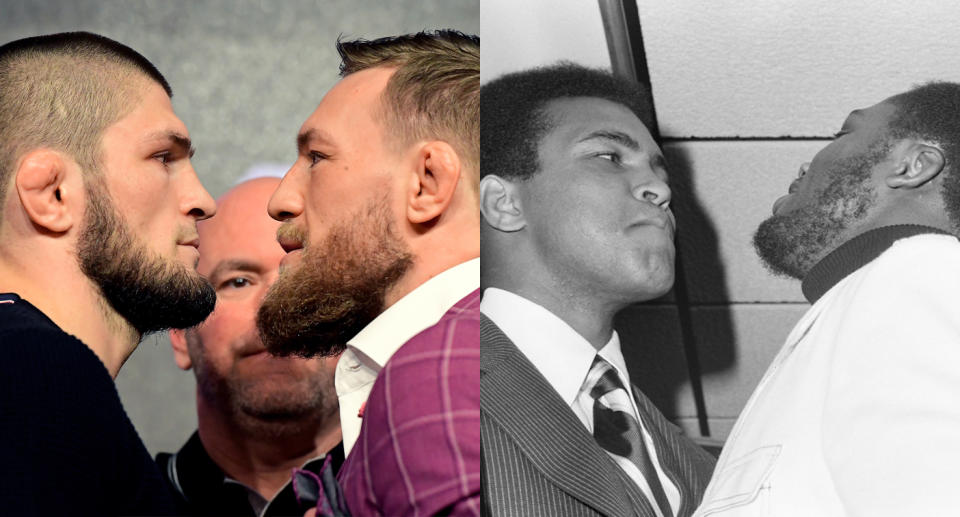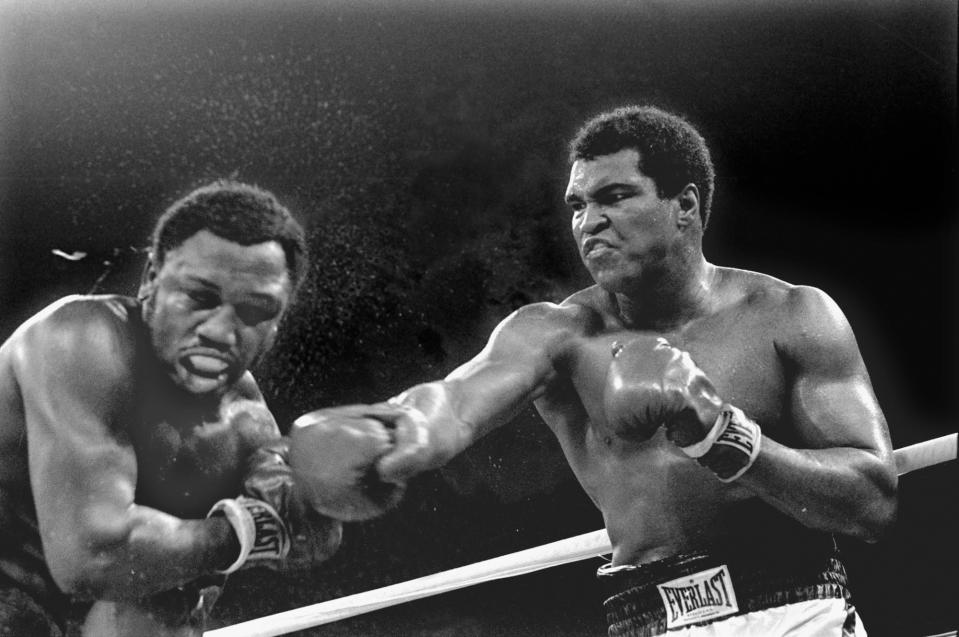Conor-Khabib bitterness parallels another great rivalry: Ali vs. Frazier

The story of Khabib Nurmagomedov’s mixed martial arts career can never be told without Conor McGregor, without the explanation of McGregor’s attack on a bus on which Nurmagomedov was seated and without McGregor’s months-long string of provocative and highly inflammatory taunts toward the UFC lightweight champion from Dagestan, Russia.
The story of McGregor’s career is far more than just a one-sided defeat at the hands of his biggest rival, though history will never forget the cruel nature of his words and the relentlessness of his verbal assault.
They’ve ensured that for as long as people talk about MMA, one name can’t be spoken without saying the other. They once were friendly acquaintances who by the nature of their sport were turned into bitter rivals.
In many ways, their rivalry mirrors the relationship between the late legendary former heavyweight champions Muhammad Ali and Joe Frazier. Professional sports of all sorts are defined by rivalries. There may never, though, have been a greater, more heated and more complex rivalry in sports than Ali-Frazier. It began when they were young men, the two best heavyweight boxers in the world, and continued until they were old men, when Frazier struggled to forgive Ali for his many transgressions. And though the two appeared cordial in public together in their later years, the hatred had softened, but never dissipated.
Nurmagomedov and McGregor are in the midst of their rivalry and it has yet to play out over decades, or even multiple fights, the way it occurred with Ali and Frazier.
But by attacking a bus on which Nurmagomedov was seated and then taunting the champion about his religion, ripping his father and taking far too many personal shots, McGregor pushed Nurmagomedov past the boiling point.
When Nurmagomedov forced McGregor to tap his submission in the fourth round of a one-sided fight on Saturday in the main event of UFC 229 at T-Mobile Arena in Las Vegas, he got what should have been the ultimate vindication.

McGregor’s words had cut to the very core of who Nurmagomedov is as a person, though, and a mere submission victory did not put out the fire that McGregor had lit inside of him. And so, in an extraordinarily bad decision, Nurmagomedov leaped over the cage after submitting McGregor to begin a brawl with McGregor’s jiu-jitsu coach, Dillon Danis.
Danis is a Bellator fighter who is more accomplished as a trash-talker at this point than he is as an MMA fighter. But he taunted Nurmagomedov, too, and Nurmagomedov couldn’t contain himself. He changed the story arc of his career forever by vaulting the cage and going after Danis, a man the majority of the 20,034 fans at T-Mobile Arena had never previously heard of.
There are differences, to be sure, but the many similarities between the McGregor-Nurmagomedov rivalry and the Ali-Frazier rivalry are eerie.
In 2000, HBO Sports broadcast a brilliant documentary on the Ali-Frazier rivalry that provided viewers with a fuller understanding of what fueled the boxers and why their rivalry persisted for so long. It may be a case where the past is prologue; a look at what is to come with the star MMA fighters.
The documentary, “Ali-Frazier: One Nation Divisible,” debuted on HBO on July 21, 2000. It explained the parallel rise to prominence of the fighters and how Frazier’s efforts to help Ali during his banishment from boxing backfired.
It detailed how while Ali meant his words as a way to promote their fights and earn each other large sums of money, Frazier took them very personally. That, in a nutshell, is why Nurmagomedov went over the cage on Saturday. McGregor was selling the fight by mocking Nurmagomedov’s father, denigrating his religion and making inflammatory personal comments about him.
At the end of the third round, it appears that McGregor says, “It’s only business,” to Nurmagomedov.
It was more than that to Nurmagomedov, just as it was to Frazier, who held onto the grudge for decades after both careers ended.
Not long after Ali was banned from boxing in 1967 for refusing induction into the military service, he was struggling to make ends meet and had taken to lecturing on college campuses in order to earn money to pay his staggering legal bills.
Frazier was there for Ali at every turn. He had spoken to politicians to plead with them to allow Ali to fight. He went along with many of Ali’s stunts, including one in which Ali came to his gym and called him out, saying they should fight in a local park.
But perhaps the best example of what Frazier tried to do for Ali during his ban was when he helped him financially after randomly running into Bundini Brown, a close Ali associate, outside of a New York hotel.

According to the documentary, Brown told Frazier and Butch Lewis, a promoter who was in the car with Frazier, that Ali was having trouble paying his hotel bill. Frazier summoned Ali into his limousine.
From the documentary:
Lewis: “We were in New York, Joe and I. Bundini Brown happened to see us pull up to the hotel and said they were having a problem with Ali’s bill. I told Bundini, ‘Let me talk to Joe about it.’ We got Ali to get into the limo.”
Frazier: “I gave him a ride. Put some love in his hand. OK? Some money.”
Lewis: “I think it’s like a couple of thousand dollars.”
Ali said no when Frazier offered to help, but Frazier insisted and Lewis shoved the money into his shirt pocket. Then, Ali exited the car and went into his act.
Lewis: “When Ali gets out of the car, it was like a switch went on. He starts, ‘All right, Frazier. Out the car now. I want you now.’”
For years, Ali would insult Frazier, and they fought three of the greatest matches in boxing history. Later in the documentary, Frazier’s son, Marvis, said, “The thing that really hurt my Dad, he gave his heart and soul to help a brother and then that brother comes back like a knife and cuts him.”
Little was out of bounds when Ali was promoting a fight. It was, after all, just business, just an attempt to sell the bout. It was nothing personal. McGregor has adopted that mantra, and uses his pre-fight talk not just to hype the show but also as a means to get into his opponents’ heads and attempt to negatively impact their performance.
McGregor’s doing nothing that Ali hadn’t done for years. And Nurmagomedov, much like Frazier, couldn’t set it aside as a joke, couldn’t overlook the many cruel, cutting, callous words that McGregor and Co. had uttered.
The number of similarities between the two situations is remarkable.
The difference is, Joe Frazier never leaped over the ropes to attack anyone from Ali’s side.
Nurmagomedov did, and he’s going to pay for that error now and into the future.
More from Yahoo Sports:
• After UFC brawl, Khabib’s dad promises punishment
• Umpire has an even worse night than Yankees
• Saints’ Kamara makes statement with clothing
• Brees becomes NFL’s all-time passing yardage king

 Yahoo Sports
Yahoo Sports 
